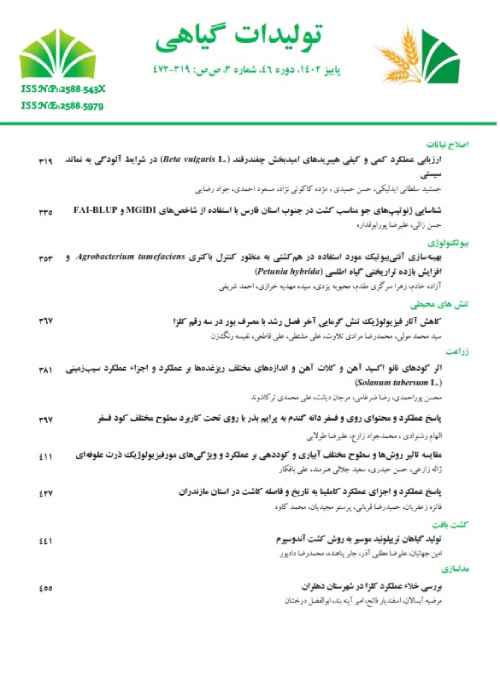Effects of mycorrhizal and rhizobium inoculation on some physiological and biochemical traits of soybean under copper toxicity
Author(s):
Article Type:
Research/Original Article (دارای رتبه معتبر)
Abstract:
Introduction
Heavy metals enter the surroundings through natural means as well as human activities. These metals reduce biomass, growth and photosynthesis and absorption of nutrients, which ultimately lead to plant death. Heavy metals such as copper, induce oxidative stress in plants by producing reactive oxygen species. Nowadays, heavy metal refining by physical and chemical methods are less used for economic and environmental reasons, and biological refining has been introduced as an alternative method. Among these, we can refer to the inoculation of plants with mycorrhizal fungi and rhizobium, which can protect the plants against this stress. The purpose of this research was to study the effects of mycorrhiza and rhizobium on the physiological and biochemical traits of soybean under copper stress.Materials and Methods
For this purpose, a factorial greenhouse experiment based on a randomized complete block design with three replications was performed in the Faculty of Science, Urmia University in 2021. Experimental factors included four levels of copper sulfate stress (0, 50, 400 and 200 mg/kg soil) and four inoculation treatments (control, mycorrhiza, rhizobium and mycorrhiza + rhizobium). Plants were colonized by inoculum Glomus verusiforme (for mycorrhiza) and Rhizobium japonicum (for rhizobium). The soybean plants were grown in 16 treatment groups with a diurnal regime of 16-hour light and 8 hours dark at 18-29°C. Forty days after planting, the harvest was done and the factors were examined. The studied traits included the activity of guaiacol peroxidase and catalase enzymes, malondialdehyde, fresh and dry weight, soluble sugar of shoots and roots and chlorophyll a and b content.Results and Discussion
Results showed that chlorophyll a and b content, soluble sugar and dry and fresh weights of shoots and roots were significantly reduced in treated plants compared to the control. This decrease was less evident in Inoculated plants than in non- Inoculated samples. However, antioxidant enzymes activity and malondialdehyde increased under copper stress. Increased enzymatic activity was more dramatic in rhizobia and mycorrhizal plants samples than non- rhizobia and mycorrhizal ones, which was the opposite of malondialdehyde. Based on the results of this study, the use of fungi and rhizobia in copper stress conditions reduced the effects of stress. The highest enzymatic activity, soluble sugar, fresh and dry weight and photosynthetic pigments and the lowest amount of malondialdehyde were observed in co-inoculation with Mycorrhiza- Rhizobia and control, respectively. The efficiency of plants inoculated with rhizobium and mycorrhizal against copper stress can be due to the reduction of oxidative stress, high antioxidant capacity, maintenance of natural plant metabolism, increased phosphorus uptake, increasing the rate of photosynthesis, Impact on heavy metals bio-availability and improvement of nitrogen fixation e in these plants.Conclusion
According to the results, it is concluded that copper stress has severe effects on effects on soybean (Saba cultivar) and inoculation with mycorrhizal fungi and rhizobia can somewhat reduce this stress. Furthermore arbuscular mycorrhiza and rhizobia had synergistic effects so in many cases co-inoculation was more effective than single inoculation. On the basis of these results, co-inoculation with Glomus verusiforme and Rhizobium japonicum is suggested for improving soybean tolerance to copper stress.Keywords:
Language:
Persian
Published:
Plant Production, Volume:45 Issue: 4, 2023
Pages:
603 to 615
magiran.com/p2583478
دانلود و مطالعه متن این مقاله با یکی از روشهای زیر امکان پذیر است:
اشتراک شخصی
با عضویت و پرداخت آنلاین حق اشتراک یکساله به مبلغ 1,390,000ريال میتوانید 70 عنوان مطلب دانلود کنید!
اشتراک سازمانی
به کتابخانه دانشگاه یا محل کار خود پیشنهاد کنید تا اشتراک سازمانی این پایگاه را برای دسترسی نامحدود همه کاربران به متن مطالب تهیه نمایند!
توجه!
- حق عضویت دریافتی صرف حمایت از نشریات عضو و نگهداری، تکمیل و توسعه مگیران میشود.
- پرداخت حق اشتراک و دانلود مقالات اجازه بازنشر آن در سایر رسانههای چاپی و دیجیتال را به کاربر نمیدهد.
In order to view content subscription is required
Personal subscription
Subscribe magiran.com for 70 € euros via PayPal and download 70 articles during a year.
Organization subscription
Please contact us to subscribe your university or library for unlimited access!




